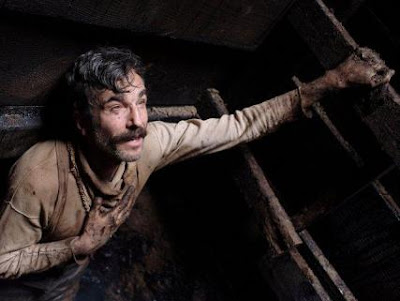
by Miné Salkin | Jan 12, 2009 | film stripped
In a world where people are constantly being bombarded by images of perfect bodies and voracious, sexual tendencies, Twilight offers a remedy to this by reinventing the modern romantic relationship through the fetishization of sexual abstinence.
The combination of hatred, the sensuality of physical attraction and the violence of drinking blood create a titillating, almost pornographic story about two lovers who abstain from anything sexual despite their unique and passionate bond.
The film, directed by Catherine Hardwicke (Thirteen, Lords of Dogtown), takes place in a little Washington town. While the time setting is current, the small-town vibe adds to the quasi-Biblical sense of morality, citizenship and propriety.
Edward Cullen (Robert Pattinson), a sharply attractive but anti-social vampire falls in love with Bella Swan (Kristen Stewart), the shy new girl. While vampires can read other people’s thoughts, Edward is inexorably drawn to Bella because he cannot read hers. She’s the female vixen who draws him in, challenges him, and makes him question his ability to restrain his appetites.

Abstinence is sexy
Diffused with moral paradigms that dictate the reasons why they can’t act on their attraction, the relationship is highly sexualized at the same time. Its like the lion who fell in love with a lamb.
We find two lovers with unparalleled sexual magnetism, but the fear of spoiling the purity of their relationship sets them apart. Edward is a vampire, and Bella is a mortal. Their challenge is that of staying together despite that fundamental difference, but getting too close will be the destruction of their ideals. If Edward drinks Bella’s blood, they can be together forever. While Bella desires this equally, the drinking of her blood represents the collapse of the natural order. Edward’s ethical prerogative battles with his carnal thirst to kill Bella – and that is the irresistible magic of this story. (more…)

by Miné Salkin | Jan 11, 2009 | film stripped
You can trace the origin of the rape revenge sub-genre from the late 1960’s, when horror films began to depart from the usual gore and violence, and began to drift into the area of ‘snuff.’ Ever since then, the film industry has not shied away from showing the piths of humankind’s perversions, violence, or general immorality. (more…)

by Miné Salkin | Nov 30, 2008 | film stripped
There’ll Always be an England
Sex Pistols: Live From Brixton Academy
a film by Julien Temple
Fremantle Media Enterprises
“We had a manager once too, and he was a cunt.”
It’s one of those bands that you absolutely must understand in order to form some reasonable opinions about the history of punk music from the tail end of the 1970’s to the present day. The Sex Pistols have been reputed as the bombastic, chaotic, and non-conformist group who set a whole new wave of classic musical groups to flourish under this new set of anti-social values. While musically, guitarist Steve Jones, drummer Paul Cook and singer John Lydon can bring back the magic and spite of the anarchistic punk revolution, Sid Vicious’ absence truly does create a gap in their otherwise seamless performance.
Without Vicious’ somehow graceful self-loathing, Lydon’s boisterous tendencies to over-dramatize just make him look like a tired caricature of his former self. At the same time though, Julien Temple’s production of the concert highlights the ultimate of an era that defined itself by thriving in an anti-social climate.

the pistols live at brixton academy
The film begins quasi-documentary in style, showing the scores of punks waiting anxiously to get into the Brixton Academy venue. Who would ever go to a Sex Pistols show? This question is self-referential. Aged, balding, overweight alongside a younger, skinny generation of punks who’s only pre-requisites are studded leather and an anarchistic attitude. Rotten describes how a Sex Pistols show attracts “all races, all creeds, people of all colours. So long as their working class I’ll have it.”
Frontman and iconoclastic punk Johnny Rotten (a.k.a. John Lydon) humbly thanks the crowd of belligerent rebels for coming to the “There’ll Always be an England Tour,” and defiantly exclaims that as long as the band lives, there’ll always be a “fucking England.”
The band started off the show with a blistering rendition of the song “Pretty Vacant” from their one and only ever recorded album Never Mind the Bollocks (1977). All the songs are complimented by a rally-like chanting from the predominantly white crowd who knows every single lyric, giving it an ominous, deep vocal glow. Temple takes artistic license during the song “Submission” by giving the camera a watery, green translucence which adds a further dimension of filth around a song about cunnilingus.

john lydon: a caricature of his former glory?
To add even further on the dimensions of filth which the Sex Pistols thrive on, here is a list of Lydon’s expressions which he peppered through the set breaks on the DVD. Please bear in mind that this list is but a mere sample of offensive statements which Lydon could surely surpass:
“I’m a very pretty pink cunt”
“I’ve forgotten the fucking words, haven’t I?”
“I’m a fat British bastard”
“You know, all you blokes and girls, want to suck on my nipples!”
“Who’s the biggest fucking cunt? fucking champagne socialists, fucking catastrophe”
and of course
“It’s the eye of the pussy”
The Sex Pistols formed in 1975 when John Lydon was at the sweet and suggestible age of 17. Formerly, the original members were in a band named The Strand dated from 1973, but two years later evolved upon Lydon’s entrance. Together, the fourtet created what many have considered to be the first generational gap in rock music, characterized by boisterous, bombastic hard rock and a destructive, anti-social attitude. Rebelling against the hippy-rock, bell-bottomed, long-haired divergent social groups from the 1960’s 70’s, the Sex Pistols made their own fashion that consisted of KY-Jellied spiked hair, tattered clothing and Doc Martens boots.

by Miné Salkin | Apr 6, 2008 | film stripped

Paul Thomas Anderson’s newest film is a gritty tale of jealousy, greed and revenge, set at the turn of the twentieth century when the American oil industry was just beginning.
Daniel Day-Lewis plays Daniel Plainview, a self-made man who starts his own drilling company and eventually attains God-like status in the infancy of American capitalism. Plainview is a loosely based adaptation of oil tycoon Edward Doheny, and this oil man is extremely reminiscent of Count Dracula. Anderson creates a character with his heart set on a misanthropic vision – to escape the falsity of other human beings who only exist to stand in his way.
Indeed, Day-Lewis’ character has an Iago-like moral imperative and only seeks to gratify his selfish designs, abandoning his adopted son in pursuit of wealth. It recalls to mind the kind of men who make up the world; only with more blood and oil saturating this industrial, harsh aesthetic.

Paul Dano (Little Miss Sunshine) plays Eli Sunday, an evangelist priest whose family’s land is sold in order to facilitate more oil drilling and greedy profits. Dano represents the naive, predictable idealism of the most flamboyant sect of Christianity which ultimately fails in its pursuit to offer salvation to the ravenous souls lost in the oily abyss of the drilling plains. It’s a classic tale of gluttony and human vice versus the powers of the good; and predictably enough, the thirst for oil conquers all.
Some other of Anderson’s films include Magnolia (1999), Punch-Drunk Love (2002) and Boogie Nights (1997), and share the same compelling insights on the darker sides of human nature.
by Miné Salkin | Nov 18, 2007 | film stripped
In a nutshell, Richard Eyre’s new film is a disturbing glimpse into the lives of two devastatingly lonely women. Judi Dench plays an embittered school teacher, an authoritarian whose depressingly vacant social life drives her to manipulate the deadly secret of the new art teacher. Sheeba Hart (Cate Blanchett) stars as the sexy, bohemian teacher who seduces the likes of a fifteen year-old student as a reaction to her fading youth and failed life aspirations. This film represents the worst taboos known to the cinematic tradition: as the cataclysmic intentions become revealed, Judi Dench’s portrayal of a desperate ageing lesbian surfaces to a longing obsession. “To be so chronically untouched that the slightest brush of the bus conductor’s hand sends a jolt of longing – straight to your groin…” Could this be any more titilating?

by Miné Salkin | May 21, 2007 | film stripped
By watching the young, confused, and tired character from Richard Linklater’s Waking Life, I realized how fortunate I was to be able to rouse myself from my dreams. Perhaps too fortunate? I’m not sure. It would be rather intriguing to be able to exercise the concept of a “lucid dream,” which the film explores, in that we are able to realize we are dreaming, and manipulate our thoughts to the point where we cannot distinguish reality from what is actually a dream. That means we can fashion a reality in our sleep which would never be socially acceptable in our own lives, we can toss aside all taboos and social mores and construct an experience for ourselves, and let the plot unfold such as we desire.

Waking Life: far more philosophical merit, deals with a plethora of existentialist philosophers, such as Sartre and Nietzsche.
Yet our poor protagonist cannot awake from these fantasies, and reawakens time and time again, only to find himself in the midst of another dream. It begs with the question regarding the nature of reality; do we truly have experiences in a realm of supposed consciousness, or do they really manifest themselves in our sleep, disguising themselves as a mere shared hallucination?
Another film which tackles this question is Fight Club, starring Edward Norton, Brad Pitt and Helena Bonham-Carter. Directed by David Fincher, Norton plays a character who suffers from severe insomnia, and becomes an existential madman in many senses. As a result, he undergoes a personal transformation and creates a secondary personality who embodies all the characteristics that he lacks himself (Tyler). Just like the bizarre experiences of our confused hero in Waking Life, Tyler has no bounds; he is powerful, persuasive, and strange. In this film, the main character’s experiences are split between his ‘true’ identity, and the second personality he creates as a result of sleep condition.
Both films provide a fascinating commentary on the role which sleep plays in our lives. One individual is frustrated by their inability to wake, and another’s anguish is derived from his inability to sleep. Yet both characters create and experience their environments – challenging themselves and questioning their purpose, bewildered by the world around them. Despite Pitt’s chiseled abs, the movie deserves 3 stars out of 5, for its sheer mainstream quality. I would give Waking Life 4.5 starts out of 5, as this film relies on its direct philosophical content.

Ed and Helena: have on-screen chemistry, but less philosophy to back it up.
 Paul Thomas Anderson’s newest film is a gritty tale of jealousy, greed and revenge, set at the turn of the twentieth century when the American oil industry was just beginning.
Paul Thomas Anderson’s newest film is a gritty tale of jealousy, greed and revenge, set at the turn of the twentieth century when the American oil industry was just beginning.







